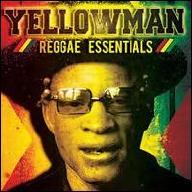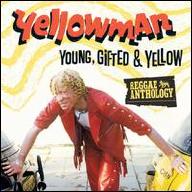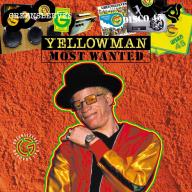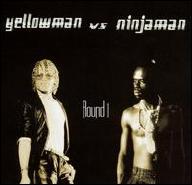Yellowman was born Winston Foster in Negril, Jamaica, in 1959 (some accounts say 1956). An early target for abuse because of his albinism, he grew up in an institution in Kingston, with little to keep him company besides music. Influenced by early toasting DJs like U-Roy, he practiced rhyming and got a job with the Gemini Sound System as a substitute DJ. Christening himself Yellowman and dressing in a bright yellow suit, he peppered his lyrics with jokes about his skin color and outlandish tales of his sexual conquests. In 1979, he won a landslide victory at the well-known Tastee Talent Contest, and within months he had become one of Jamaica's top concert draws, thanks to a dynamic, humorous stage show in which he often used the microphone to mimic his anatomical gifts.
Yellowman recorded prolifically in the early '80s, at one point flooding the Jamaican market with more than 40 singles. His first full-length album, Them a Mad Over Me, was recorded for Channel One in 1981 and featured the hit title track and the single "Me Kill Barnie," an answer record to Lone Ranger's hit "Barnabas Collins." He also scored with singles like "Operation Eradication" and the infamously slack "Shorties," which Peter Tosh condemned as degrading to women (hardly the first time such a criticism would be leveled at him). Despite this success, Yellowman didn't truly hit his stride on record until he hooked up with groundbreaking dancehall producer Henry Junjo Lawes. The 1982 LP Mister Yellowman kicked off their collaboration; released internationally by Greensleeves, it started to break him in the U.K. and U.S., and is still often acclaimed as his best album. It also launched a series of Jamaican hit singles over the next few years that included "Yellowman Getting Married" (a rewrite of the My Fair Lady number "I'm Getting Married in the Morning"), "Mr. Chin," "Who Can Make the Dance Ram" (a rewrite of "The Candy Man"), "Zungguzungguguzungguzeng" (sampled by several hip-hop acts), "The Good, the Bad, and the Ugly," "Soldier Take Over," "Nobody Move Nobody Get Hurt," and "Wreck a Pum Pum," among others. Many of his recordings during this era featured vocal contributions from fellow DJ/toaster Fathead, whose specialty was punctuating lines with animal noises ("ribbit" and "oink" were his favorites).
After 1983's Zungguzungguguzungguzeng album, Yellowman signed a major-label deal with CBS Records, which encouraged him to maintain the stylistic versatility of his previous work. However, his lone album for the label, 1984's King Yellowman, sported mixed results, attempting everything from slack toasts to R&B and pop-tinged crossover tracks, including covers of "Sea Cruise" and "Take Me Home Country Roads," and the much-maligned fusion attempt "Disco Reggae." He subsequently released several albums on Shanachie, including 1984's Nobody Move Nobody Get Hurt, 1985's Galong Galong Galong, 1986's Going to the Chapel, and 1987's Don't Burn It Down. The latter found him delving more into social consciousness; the title cut was a pro-marijuana protest, while "Stop Beat Woman" condemned domestic violence and "Free Africa" criticized apartheid. Around the same time, he suffered a bout with cancer that required the removal of part of his jaw, leaving him facially disfigured. Always a fighter, he nonetheless returned to action with the hit Fats Domino cover "Blueberry Hill," and moved to the Ras label to record the well-received Yellow Like Cheese album with producer Philip Fatis Burrell.
Yellowman's recording career continued apace, as his sexual boasts and gay jokes kept getting raunchier and nastier. His popularity had slipped after 1985, due in part to less consistent material, and also in part to the emergence of a legion of new dancehall artists, many of whom harked back to his early material for inspiration. Things changed, however, after an early-'90s bout with skin cancer. Greatly shaken after this second life-threatening illness, Yellowman completely rethought his approach to music, and thereafter devoted himself almost exclusively to spiritual and social concerns. 1994's Prayer album (still on Ras) was the first effort in this new direction, and it was followed quickly by Message to the World in 1995. 1997's Freedom of Speech continued in a similar vein, after which Yellowman switched over to the Artists Only label. His first effort was 1999's Yellow Fever, which concentrated on conscious reggae but also featured some good-natured party tracks. Following the 2003 release of New York, Yellowman entered a lengthy recording hiatus, though he continued to perform live.
In 2019, 16 years after his last album, he returned with No More War. The LP was the inaugural release on Yellow Baby Records, a label launched by Yellowman's daughter K'reema, with whom he also collaborates. ~ Steve Huey, Rovi
















